Publikationen im Bereich Menschen, Qualifikation und Gender
Es wurden 70 Einträge gefunden.
Women in Tech - Time to close the gender gap
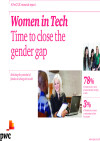
Despite decades of progress towards workplace equality, women remain woefully underrepresented in the UK’s technology workforce. The figures speak for themselves: according to the Women’s Engineering Society (WES)1, just 15% of the people working in STEM (Science, Technology, Engineering and Mathematics) roles across the UK are female – and only 5% of leadership positions in the technology industry are held by women.
Andrews Jon; Hinton Laura; Ash Sheridan
Herausgeber: PricewaterhouseCoopers (PwC) UK
Englisch
Downloads zur Publikation
Getting to Equal: How Digital is Helping Close the Gender Gap at Work

One of the most significant accelerators of gender equality in the workplace is already demonstrating its potential. Digital fluency, the extent to which people embrace and use digital technologies to become more knowledgeable, connected and effective, is helping to close the gender gap and level the playing field for women at work.
Herausgeber: Accenture GmbH
Englisch
Downloads zur Publikation
Explaining the Gender Wage Gap in STEM: Does Field Sex Composition Matter?
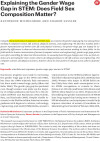
Using the National Science Foundation’s SESTAT data, the study examines the gender wage gap by race among those working in computer science, life sciences, physical sciences, and engineering.
Michelmore, Katherine; Sassler, Sharon
Herausgeber: The Russell Sage Foundation
Mehrsprachig
Downloads zur Publikation
STEM Graduates and Secondary School Curriculum: Does Early Exposure to Science Matter?
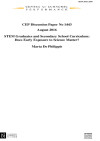
Increasing the number of Science, Technology, Engineering and Math (STEM) university graduates is considered a key element for long-term productivity and competitiveness in the global economy. Still, little is known about what actually drives and shapes students' choices. This paper focusses on secondary school students at the very top of the ability distribution and explores the effect of more exposure to science on enrolment and persistence in STEM degrees at the university and on the quality of the university attended.
De Philippis, Marta
Herausgeber: London School of Economics and Political Science, Centre for Economic Performance
Englisch
Downloads zur Publikation
Gender Diversity on European Boards - Realizing Europe‘s Potential: Progress and Challenges
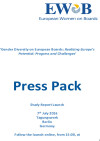
The study focuses on a key segment of the European economy: the 600 largest European-listed companies, which together comprise the STOXX Europe 600 Index. This elite group of large European corporations includes many of our continent’s most recognisable business names. These are the enterprises that should be leading the way in the implementation of the Europe 2020 strategy of smart, sustainable and inclusive growth.
Herausgeber: European Women on Boards (EWoB) in Zusammenarbeit mit ISS
Englisch
Downloads zur Publikation
Does corporate gender equality lead to outperformance?
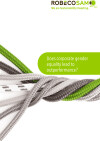
Gender equality from a corporate perspective encompasses issues of workforce diversity as well as equal pay and career opportunities. Analysis of a unique gender based dataset collected by RobecoSAM and based on criteria identified in collaboration with the EDGE Certified Foundation confirms that there is inequality across all industries in terms of gender representation, pay and promotion. Our work is consistent with the growing body of academic research that finds that gender diversity and equality contribute to better corporate performance and investment returns.
Rachel Whittaker
Herausgeber: Robeco SAM AG, Switzerland
Englisch
Downloads zur Publikation
Women are underrepresented in fields where success is believed to require brilliance
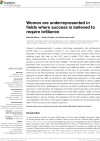
Women's underrepresentation in science, technology, engineering, and mathematics (STEM) fields is a prominent concern in our society and many others. Closer inspection of this phenomenon reveals a more nuanced picture, however, with women achieving parity with men at the Ph.D. level in certain STEM fields, while also being underrepresented in some non-STEM fields. It is important to consider and provide an account of this field-by-field variability.
Leslie, Sarah-Jane; Cimpian, Andrei; Meyer, Meredith
Herausgeber: Frontiers in Psychology
Englisch
Downloads zur Publikation
Studying Gender Bias in Physics Grading: The role of teaching experience and country

The existence of gender-STEM (science, technology, engineering, and mathematics) stereotypes has been repeatedly documented. This article examines physics teachers’ gender bias in grading and the influence of teaching experience in Switzerland, Austria, and Germany.
Sarah Hofer
Herausgeber: ETH Zürich, Schweiz
Englisch
Downloads zur Publikation
Gendered Innovations. How Gender Analysis contributes to research.
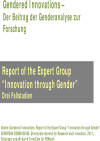
Report of the Expert Group “Innovation through Gender”. Three Case Studies
Herausgeber: European Commission, Directorate-General for Research and Innovation
Englisch
Downloads zur Publikation
Is Gender Diversity Profitable? Evidence from a Global Survey
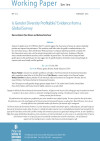
Analysis of a global survey of 21,980 firms from 91 countries suggests that the presence of women in corporate leadership positions may improve firm performance. This correlation could reflect either the payoff to nondiscrimination or the fact that women increase a firm’s skill diversity.
Marcus Noland, Tyler Moran, Barbara Kotschwar
Herausgeber: PIIE - Peterson Institute for International Economics
Englisch
Downloads zur Publikation
When Women thrive, businesses thrive
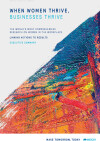
The world's most comprehensive research on women in the workplace
Herausgeber: Mercer
Englisch
Downloads zur Publikation
Double Jeopardy? Gender Bias Against Women of Color in Science
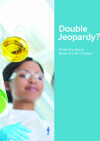
This report examines whether the four distinct patterns of gender bias that have been documented in experimental social psychologists’ labs reflect what is actually occurring at work for women in the STEM fields, and particularly for women of color.
Joan C. Williams, Katherine W. Phillips, Erika V. Hall
Herausgeber: UC Hastings College of the Law
Englisch
Downloads zur Publikation
Gender Equality Policies in Public Research
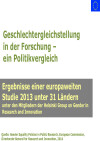
This report on “Gender Equality Policies in Public Research” is based on a survey among the members of the Helsinki Group, the Commission’s advisory group on gender, research and innovation. It gives a detailed analysis of the current state-of-play of EU Member States’ and associated countries’ initiatives for promoting gender equality in research and innovation.
Herausgeber: European Commission
Englisch
Downloads zur Publikation
Gender Diversity in Silicon Valley
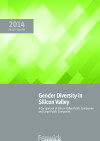
A Comparison of Silicon Valley Public Companies and Large Public Companies
Bell, David A.; White, Shulamite S.
Herausgeber: Fenwick & West LLP
Englisch
Downloads zur Publikation
She Figures 2015 - International comparison of developments in equal opportunities in research, technology, and innovation
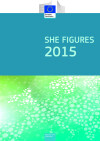
She Figures 2015 investigates the level of progress made towards gender equality in research & innovation (R&I) in Europe. It is the main source of pan‑European, comparable statistics on the representation of women and men amongst PhD graduates, researchers and academic decision‑makers.
Herausgeber: European Comission, Directorate-General for Research and Innovation (Unit B.7 Science with and for Society)
Englisch
Downloads zur Publikation
Arbeitsbedingungen, Gleichstellung und COVID-19: Ergebnisse der Gleichstellungserhebung 2020 in der außeruniversitären naturwissenschaftlich-technischen Forschung
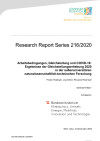
Auf Basis der Ergebnisse der Gleichstellungserhebung 2020 können empirische Evidenzen und Schlussfolgerungen präsentiert werden, wie sich Gleichstellung in der außeruniversitären naturwissenschaftlich-technischen Forschung in Österreich seit 2017 entwickelt hat und wie sich die COVID-19 Pandemie auf diese Forschungseinrichtungen und die Arbeitsbedingungen der Wissenschaftler:innen ausgewirkt hat.
Holzinger Florian, Schön Lisa, Rosenball Riccarda
Herausgeber: Joanneum Research (2020) im Auftrag des Bundesministeriums für Klimaschutz, Umwelt, Energie, Mobilität, Innovation und Technologie
Mehrsprachig
Downloads zur Publikation
Promising Practices for Addressing the Underrepresentation of Women in Science, Engineering, and Medicine: Opening Doors
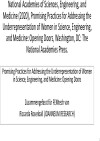
Die vorliegende Studie zeigt die relevanten Handlungsfelder zur Förderung der Gleichbehandlung der Geschlechter in Forschungseinrichtungen auf. Die vier wichtigsten Schlussfolgerungen lauten: ein komplexes Phänomen kann nur durch systematisches Vorgehen verändert werden. Das verlangt Transparenz und Verantwortungszuweisung, eine evidenzbasierte Entwicklung von Strategien und Maßnahmen, die verpflichtend umgesetzt und regelmäßig überprüft werden müssen.
Colwell, Rita; Bear, Ashley; Helman, Alex
Herausgeber: National Academies of Sciences, Engineering, and Medicine
Deutsch
Downloads zur Publikation
Weiterhin kaum Frauen in den Vorständen großer Unternehmen: Auch Aufsichtsräte bleiben Männerdomäne (D)
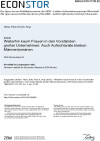
Das DIW Berlin untersucht seit 2006 den Anteil von Frauen in Vorständen und Geschäftsführungen (nachfolgend Vorstände) sowie in Aufsichts- und Verwaltungsräten (nachfolgend Aufsichtsräte) der nach dem Umsatz größten Unternehmen in Deutschland. Die vorliegende Erhebung umfasst die größten 200 Unternehmen außerhalb des Finanzsektors. Zusätzlich wurden die DAX-30-, MDAX-, SDAX- und TecDAX-Unternehmen und 60 Beteiligungsunternehmen des Bundes ausgewertet.
Elke Holst, Anja Kirsch
Herausgeber: DIW Berlin - Deutsches Institut für Wirtschaftsforschung e. V.
Deutsch
Downloads zur Publikation
From gender equality to household earnings equality: The role of women’s labour market outcomes across OECD countries
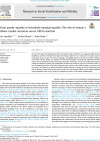
Der Gender Pay Gap - der Unterschied in den Durchschnittslöhnen von Frauen und Männern wurde - umfassend erforscht und stellt auch heute noch ein gesellschaftliches Problem dar. Es gibt viele Gründe für das Lohngefälle, darunter Unterschiede in der Ausbildung, der Berufserfahrung sowie kulturelle und soziale Faktoren. Zudem gibt es in vielen Ländern auch große Diskrepanzen zwischen den Haushaltseinkommen. Die Studie geht der Frage nach, wie sich die Gleichstellung der Geschlechter auf dem Arbeitsmarkt auf die Einkommensungleichheit zwischen den Haushalten auswirken würde.
Leo Azzollini; Richard Breen; Brian Nolan
Englisch
Downloads zur Publikation
Frauen.Management.Report.2015: Frauen in Geschäftsführung & Aufsichtsrat der Top 200 und börsennotierten Unternehmen
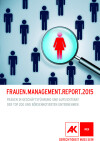
Mit den vergleichsweise niedrigen Frauenanteilen in den Leitungsorganen bleibt Österreich deutlich hinter dem EU-Schnitt von 20 Prozent zurück: Die wichtigsten Impulse kommen europaweit aus jenen Ländern (wie Frankreich, Island, Italien), die rechtlich verbindliche Vorschriften verankert haben. Den höchsten Anteil von Frauen in den höchsten Leitungsorganen der europäischen Wirtschaft halten laut aktuellen Daten der EU-Kommission Island (45 Prozent) und Norwegen (38 Prozent).
Sonja Spitzer, Christina Wieser
Herausgeber: Kammer für Arbeiter und Angestellte für Wien, Abteilung Betriebswirtschaft
Deutsch
